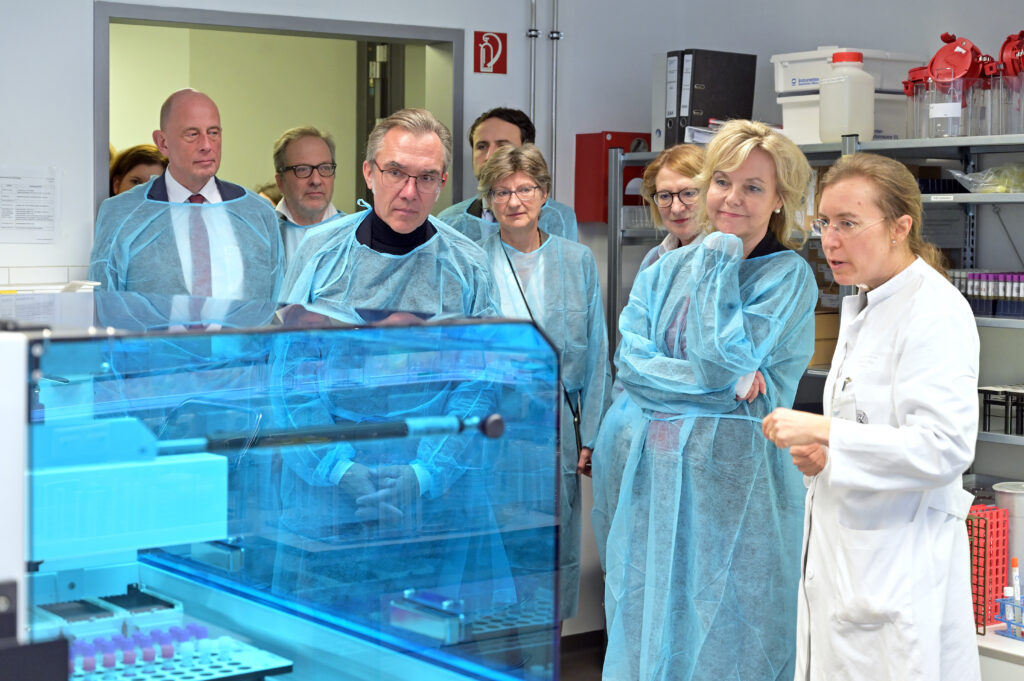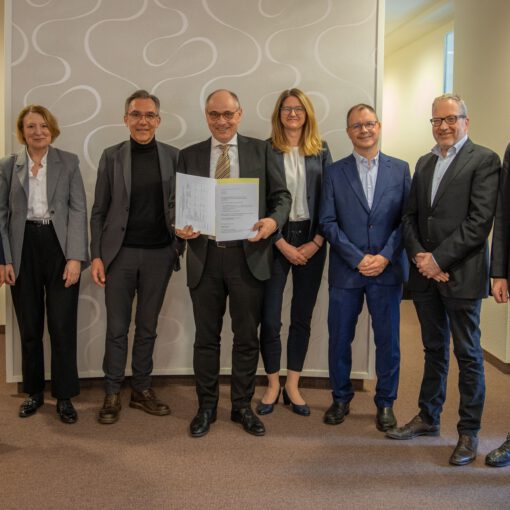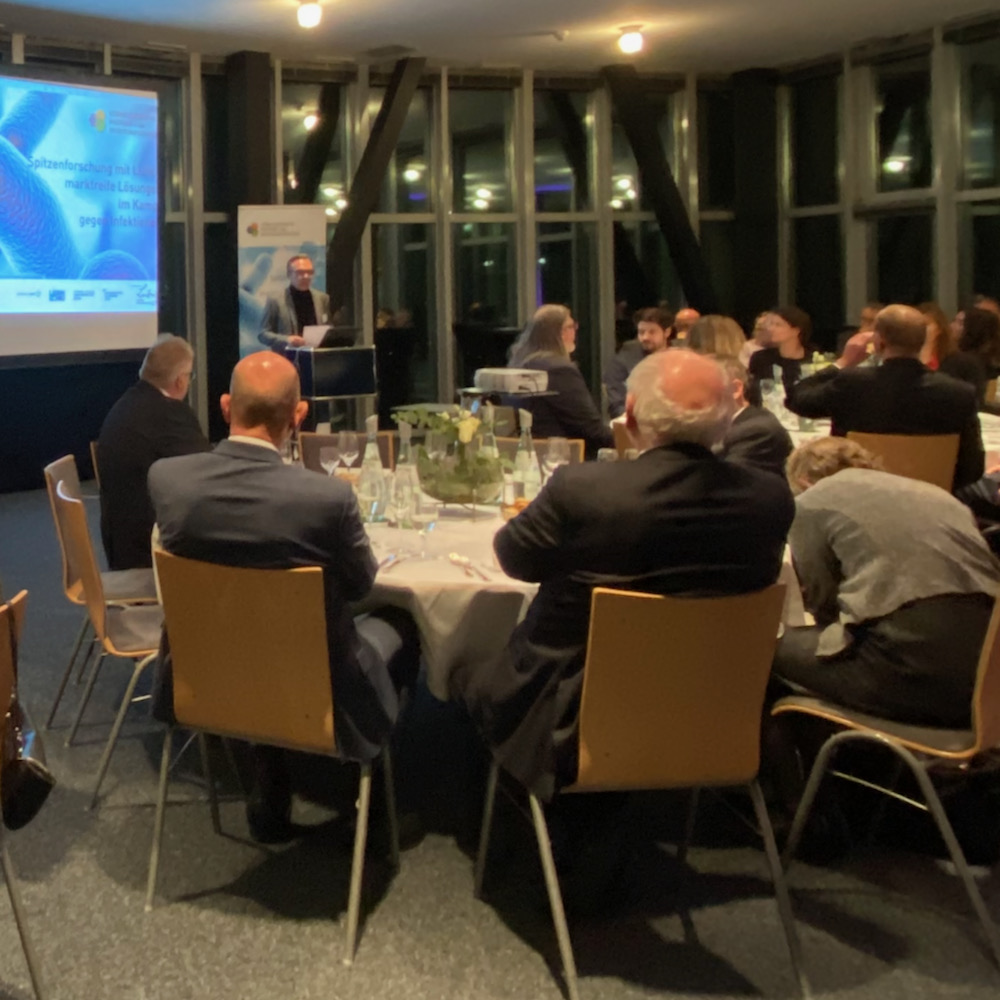Light-based technologies offer enormous potential for combating infectious diseases more effectively and coping better with future pandemics. However, a lot of time passes before the findings in the laboratory become a new drug or therapy. With the Leibniz Centre for Photonics in Infection Research (LPI), a research infrastructure is being created in Jena that will close this gap between basic research, clinical practice and product development so that research findings reach people more quickly. On November 7, 2023, Prof. Dr Sabine Döring, State Secretary at the Federal Ministry of Education and Research (BMBF), and Thuringia’s Minister for Economic Affairs, Science, and Digital Society, Wolfgang Tiefensee, were informed of the status of the development of Jena University Hospital’s globally unique infrastructure for translational research.

Prof. Dr Bettina Löffler, Head of the Institute of Medical Microbiology at the UKJ (1st from right) and LPI spokesperson Prof. Dr Jürgen Popp (Scientific Director Leibniz-IPHT, 3rd from left) present a laboratory in the Medical Microbiology Department at the UKJ to BMBF State Secretary Prof. Dr Sabine Döring (2nd from right) and Economics Minister Wolfgang Tiefensee (1st from left). Also in the picture, from left: Prof. Dr Thomas Kamradt (Scientific Director of the JUH and Dean of the Faculty of Medicine, 2nd from left), Ulrike Geiger (Head of the BMBF Department) and Dr Brunhilde Seidel-Kwem (Commercial Director of the JUH). Picture: Michael Szabó/JUH
Technological processes that use light as a tool could fundamentally transform the diagnosis of infectious diseases. They measure quickly, sensitively and without contact. In combination with artificial intelligence, they provide a decisive time advantage in the treatment of life-threatening infections and enable customised therapies.
To facilitate the development of these light-based, specifically photonic processes, the Federal Ministry of Education and Research (BMBF) is providing infrastructure in the form of the Leibniz Centre for Photonics in Infection Research (LPI) in Jena, where the translation of research results into marketable products – the path from the laboratory to the hospital bed – is considered from the start and driven forward in a standardised process chain.. The LPI is being set up by the Leibniz Institutes of Photonic Technology (Leibniz IPHT) and Natural Product Research and Infection Biology (Leibniz-HKI) in Jena, the Friedrich Schiller University and Jena University Hospital (JUH).
Economics and Science Minister Wolfgang Tiefensee regards the Leibniz Centre as a vital building component for Thuringia’s further profile, particularly the ‘Optical Valley Jena’ in optical health innovations. e assured the centre of the state’s full support. ‘The LPI brings together important Thuringian fields of expertise in photonics and infection research. The combination of photonic technologies, basic microbiological research and clinical application in this form is a truly unique selling point of the location. This allows better active substances and methods to be developed to combat pandemics, infectious diseases and antibiotic resistance.’ The most important goal of the LPI is to quickly transfer research results into practice and thus drastically shorten the development times of new drugs and therapies, the Minister continued. ‘In this way, the centre also provides impetus for more growth and employment in the healthcare industry and ultimately contributes to maintaining Germany’s technological sovereignty in drug development and infection research.’
During her visit to the University Hospital in Jena, BMBF State Secretary Prof. Dr Sabine Döring was impressed by the innovative diagnostic procedures being researched at the LPI and by the concept of the centre as a place where ideas for the diagnosis and treatment of infectious diseases with light can be developed in the future and rapidly brought to market maturity.
The LPI is more than just a research institute. As a one-stop agency, it combines research, technology development and everyday clinical practice and thus provides an infrastructure in which all the steps necessary for product development are interlinked – from validation on patient samples to support in product design and small series production. The centre is open to the national and international scientific community and will also enable small and medium-sized companies and start-ups to achieve valid results more quickly. Industry and authorities will be involved from the outset to ensure the smooth market entry of new diagnostic procedures and therapeutic approaches.
‘The LPI starts where promising results from research and technology development often threaten to fail: on the way from the laboratory to medical care,’ explains Prof Dr Jürgen Popp, Scientific Director of Leibniz IPHT and spokesperson for the LPI. ‘The LPI is doing pioneering work: for better preventive measures and therapies for patients – and for a fundamental change in the transfer of knowledge from research to society. With its globally unique infrastructure, the LPI can become a beacon project for infection research, whose approach can be transferred to other scientific and medical fields of application.’
The LPI’s close connection to Jena University Hospital is crucial to the success of the holistic concept. Equipped with S2/S3 safety laboratories, the LPI building on the grounds of the JUH will give users access to the latest innovations in photonics – the basic technologies being researched as part of the project – as well as the latest commercial optical and molecular technologies.
In addition, the LPI will provide a fundamentally new infrastructure in the intensive care unit with a first-in-patient unit (FiPU). This will offer life-threatening patients the opportunity to utilise life-saving solutions that are still being researched and tested on the market. The design planning for the FiPU is currently underway; the conversion work is scheduled to begin in early 2024. ‘With this study ward, the LPI will take clinical infection research in Germany to a whole new level,’ emphasises Prof. Dr Thomas Kamradt, Scientific Director of the JUH and Dean of the Faculty of Medicine. ‘The research and development teams at the LPI are in close contact with clinical practice from the outset, and medical innovations must ultimately be measured against their high standards.’
Parallel to the development of the technological infrastructure and the establishment of new spectral-optical imaging technologies and chip-based methods, the management and governance structures of the LPI are currently being created and the preliminary planning for the construction is being driven forward. The client is the University Hospital.




